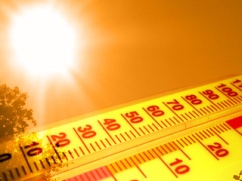 VICTORIA’S enduring summer heat wave in January this year saw more than 850 people die, an increase of 24 per cent from previous years.
VICTORIA’S enduring summer heat wave in January this year saw more than 850 people die, an increase of 24 per cent from previous years.
According to an analysis of excess deaths during the significant heat wave conditions this year, which saw the hottest four-day period on record between January 14 and 17, there were 858 deaths during the week of the heat wave.
Health Minister David Davis said with 691 deaths expected, based on deaths data from previous years, this represents an estimated 167 excess deaths and corresponds to a 24 per cent increase in deaths.
This compares to an estimated 374 excess deaths in the 2009 heat wave which was a 62 per cent increase in mortality, despite the 2014 heat wave lasting one day longer.
Parts of the state recorded temperatures of 45 degrees or more on three consecutive days and Melbourne experienced temperatures in excess of 41 on each of the four days of the heat wave.
Although maximum temperatures in 2014 were slightly lower than those recorded during the heat wave in January 2009, mean temperatures were high and the heat lasted for a longer period of four days of extreme heat in 2014, compared with three days in 2009, Mr Davis said.
Health service data show significant increases in primary care and emergency service use during the week of the January 2014 heat wave, especially in relation to heat-related diagnoses and emergency cardiac care.
For instance, there was a 25 per cent increase in emergency dispatches in the metropolitan area attended to by Ambulance Victoria during the heat wave, with a 97 per cent increase in Priority ‘0’ emergency cardiac dispatches.
The health impact data in the report also show that older people, who may be particularly vulnerable to the impact of extreme heat, are overrepresented in the statistics.
There was a seven per cent increase in overall emergency department presentations during the week of the heat wave, with a 23 per cent increase observed for people aged 75 years or more.
Mr Davis said this is a timely reminder for all Victorians to think about their personal plans for heat as summer approaches.
“In hot weather community members should take care of themselves and check on older, sick and frail relatives, friends and neighbours who may need help coping with the heat. Those most at risk are people over 65 years, particularly those living alone, people who are unwell, especially with heart or kidney disease and people who have a disability or mental illness,” Mr Davis said.
“Elderly people are more prone to heat stress than younger people because their body may not adjust well to sudden temperature change. They are more likely to have a chronic medical condition and to be taking medication that may interfere with the body’s ability to regulate temperature.”
